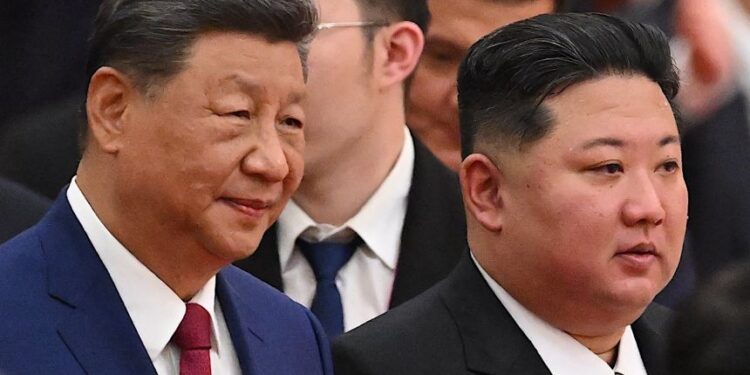Chinese leader Xi Jinping and North Korea’s Kim Jong Un have sat down for formal talks in Beijing, a day after the pair and Russia’s Vladimir Putin put on an unprecedented show of unity against the West at a massive military parade.
Xi and Kim began their meeting at the Great Hall of the People on Thursday, Chinese state media reported, in their first formal sit-down in six years. The two leaders last met in Pyongyang in 2019, during Xi’s first state visit to North Korea.
Xi, Putin and Kim took center stage at China’s military parade marking 80 years of the end of World War II on Wednesday.
The trio – who had never appeared together in public before – formed the defiant face of an emerging bloc of illiberal leaders determined to push back against Western rules and tilt the global balance of power in their favor.
The parade – attended by leaders of 26 countries including Iran, Pakistan and Belarus – gave the heavily sanctioned Kim a rare chance to stand alongside political heavyweights on the global stage.
The staggering show of China’s military might capped days of diplomacy and pageantry by Xi to tout his country as an alternative global leader to the United States, at a time when President Donald Trump is upending American alliances and waging a trade war.
After the parade, Kim and Putin met for two and a half hours on the sidelines, where they discussed “long-term” cooperation plans, according to North Korean state media. Putin praised North Korean troops fighting alongside
In a statement, Kim praised the ceremony and indicated that North Korea is “willing to enhance exchanges with China at all levels.”
“The commemoration not only highlighted the historic contributions of the Communist Party of China and the Chinese people’s courageous struggle for world peace and stability, but also powerfully demonstrated China’s elevated international status and influence,” Kim said.
“For this, I feel as happy as if it were my own matter,” he added.
China has been the main political and economic patron for North Korea for decades, accounting for over 95% of its total trade and providing a crucial lifeline for its heavily sanctioned economy. North Korea is also China’s only formal ally, with a mutual defense treaty signed in 1961.
But as Pyongyang has greatly expanded its missile and nuclear programs since the early 2000s, some foreign policy analysts in Beijing increasingly saw North Korea as more of a liability than strategic ally.
In recent years, North Korea has moved closer to Russia as Putin turned to Kim for weapons and troops to sustain his war on Ukraine. Last year, the two leaders signed a landmark mutual defense pact in Pyongyang, committing to provide immediate military assistance to each other if under attack – a move that has rattled the US and its Asian allies.
Beijing is worried that Moscow’s assistance to Pyongyang in return for its weapons and troops – especially on military technology – would further enable and embolden the erratic Kim regime, which has drastically accelerated the buildup of nuclear weapons and missile programs.
























